putterings 507 < 508 > 509 index
you fail to inspire trust
“And you have been a good friend of mine. Do you know why, with all your good qualities — and they are many — you fail to inspire trust?”
“I think I ought to after what you’ve said. But let me say something. I know I’m not accomplishing anything; but part of it is due to the easy condition of life here. Whether I do, or leave undone, a thing seems of so little importance, and I haven’t naturally the commercial instinct. If I could accomplish something by some great risk, I would do it; but daily puttering after my niggers, and scheming to make or save a dollar, seems a waste of time. Life is so short, and there are so many pleasant things to do. Hugh Carrington has three big plantations to look after, is in the saddle from sun to sun nearly every day, and what does he get out of life? I suppose he is a rich man, or will be — what of it?”
— from a conversation between Bessie Taylor (General Gault’s stepson’s widow, and closest in affection to him) who will ultimately inherit the plantation, and St. Clair her uninteresting suitor and future husband) — both thoroughly drawn in the novel, but neither of them its most significant characters, in
Henry Burnham Boone and Kenneth Brown, The Redfields Succession : A Novel (1903) : 104
Harvard copy/scan (one of two via hathitrust) : link
U Michigan copy/scan (via google books) : link
LoC : permalink
This is the second of two novels co-authored by Boone and Brown, and set in Virginia. The first was Eastover Court House (1901), available (Harvard and U Virginia copy/scans) via hathitrust : link
The Redfields Succession and its authors are interesting enough, and forgotten enough, to encourage cobbling together this longer page devoted to both, in these sections —
Kenneth Brown
Henry Burnham Boone
some reviews of, and ruminations en passant
▌ bar at left returns to top of page.
![]()
- Kenneth Brown (1868-1958)
wikipedia : link, from which —
“For some years he was in newspaper work in Boston, New York, Baltimore, and Chicago... He left the newspaper business and became involved in raising thoroughbred horses, in Virginia, until 1896.”_250w314h.jpg)
Kenneth Brown passport application photo (cropped), from wikipedia (above).
Brown evidently found time, during his time among Virginia’s horses and horse-y set, to edit (as “chief contributor”) The Magpie, a humorous little magazine whose numbers 1:1 (June 1896) through 1:5 (October 1896) can be viewed via hathitrust : link (Harvard copy/scan)
and within which, a search for the word “horse” lands one on some nice passages.Brown co-authored two books with his wife Demetra (Vaka) Brown (1877-1946), a Greek born in the Princes Islands near Istanbul, who found her way to the U.S. (to “escape an arranged marriage”) and wrote other books under her own name.
wikipedia : linkPapers of Kenneth Brown ca. 1880-1954, University of Virginia Library
“The son of Franklin B. and Caroline Morrill Brown, Kenneth Brown (1868- ) was born in Chicago and lived in Europe as a youth...”
link (20250103)
The papers are from the estate of Kenneth’s sister, Francesca.Kenneth and Francesca were the children of Franklin B. (1824-1870) and Caroline Frothingham (Morrill; 1837-1932) Brown; thus, their father died when they were quite young. Franklin B. Brown appears to have been associated with the Brown Brothers Mfg. Co., of Chicago; see the website devoted to that firm (and especially to Edwin Lee Brown, Franklin's brother) : link
also see the findagrave pages of Franklin B. Brown : link — the inscription on his gravestone reading “Weep for his children — too young to weep for themselves” —
and Caroline Morrill Brown : linkTheir portraits were painted, as a pair, in 1873 by the prominent American artist George Peter Alexander Healy (1813-94; wikipedia), probably while he — and they — were in Paris.
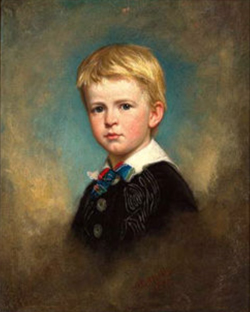
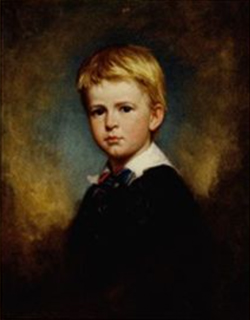
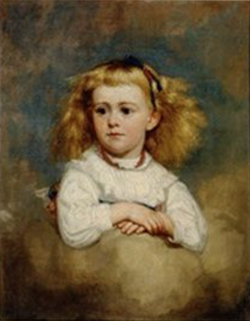
portrait of Kenneth Brown via askart : link the two portraits (same, different photo? of Kenneth) and Francesca Brown via NiceArtGallery : link - Henry Burnham Boone (1872-1932), lawyer, writer, land developer
“...practiced law in Virginia, Florida and Massachusetts before retiring several years ago.”
from A. P. death notice, from New Britain, Conn., in The New York Times (March 19, 1932) : link (paywall)
The Times omits a paragraph from his A.P. death announcement, that is found at his findagrave page : link —
“Henry B. Boone was the son of John Boone who was a popular tailor and clothier here years ago.”“Here” was Fall River, Massachusetts, where his sister was a school principal, and named a son Henry B.
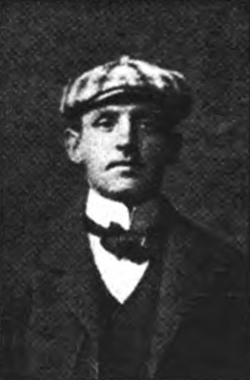
portrait and biographical sketch in The Green Bag 17:8 (Boston, August 1905)
U Michigan copy/scan (via hathitrust) : link
Even a law magazine is entitled to indulge in fiction in midsummer though the narrative of Florida practice which we publish is, we are told, a true story. We suspect, moreover, that the author could identify his hero. If the strictness of any of our brothers beclouds his sense of humor and he is disposed to criticise the ethics of the alleged Mr. Brown, be it known that the author, though trained at the Bar and a former practitioner, has, like so many other lawyers of literary talent, deserted the field that even Lord Bramwell found three quarters dry, for the more joyful land of romance.
Mr. Boone is a graduate of Williams College and of the Law School of the University of Virginia. His early practice was in Florida and Charlottesville, Virginia, where he now makes his home. The success of his stories of Virginia life has led him to take up a temporary residence in Italy, and to devote his entire time to literature. We are promised, however, some studies of modern Italian theories of jurisprudence.in same number, “Commonwealth v. Lamb” (pp472-478) : link
appears a humorous legal story set in Florida, with exaggerated dialect recalling that in The Redfields Succcession, which had been published two years previous.wikipedia has a useful entry on The Green Bag : link
—
In addition to the two novels co-written with Kenneth Brown, Boone authored The Career Triumphant (1903)
U Virginia copy/scan (via hathitrust) : linklots of telegrams, travel to Italy (where Boone lived for a time, presumably with his wife Francesca)
The novel received a tepid notice in The New York Times (September 26, 1909) : link —
The Career Triumphant opens well, despite its too insistent horsiness, but with the impossible absurdity of the maddest marriage ever arraigned, even in a novel, the tale ceases to carry conviction with it... The book has some clever, epigrammatic sayings, is written with vivacity, and will afford pleasant diversion for an idle afternoon.”The book is also dismissed in The Dial (October 16, 1903) : 262
archive.org : link“Mr. Henry Burnham Boone, who has written two Virginia novels in conjunction with Mr. Kenneth Brown, now gives us, in >The Career Triumphant, a book that is wholly his own. It is a breezy book, with no pretensions to style, telling its story pleasantly, and from an intimate acquaintance with the ways of Virginians. The heroine is a talented girl who makes for herself a ‘career triumphant’ upon the stage, and the conflict between her ambition and her love keeps the story going until it has attained the dimensions necessary to a selfrespecting novel. This feat is accomplished by a resort to the old device of the misunderstanding which keeps the lovers apart for several years. It is hard to imagine what our novelists would do if they had not this trick to fall back upon, or if their readers were suddenly to lose interest in persons who, otherwise sensible and intelligent, are represented as capable of this particular sort of foolishness where their chief interests are concerned.”
The Career Triumphant was received more favorably in The Savannah Morning News (October 5, 1903), not without some confusion in its sketch of the plot, however
Georgia Historic Newspapers : link —“The Career Triumphant by Henry Burnham Boone, just published by D. Appleton & Co., New York, is by far the best of the several works that have emanated from the pen of this author. Abounding in beautiful descriptions which have for their framework a plot not too intricate, but one that holds the interest of the reader, the story brings to his mind a succession of pleasant surprises until the last page is reached. The book deals with plantation life and throughout the love of the chase and the pride of the stable and the kennel are dominating features. The heroine, a Southern girl, and an orphan, without a heritage other than a wonderful voice, having a winning disposition and beautiful features, decides to study for the stage and achieve operatic successes. Through the scheme of Col. Beriston, a wealthy uncle of Lee Beriston, the hero of the story, who had lost a fortune invested in a Florida orange plantation, the two were married and made heirs to the estate. The girl, fearing that her future husband would make her give up her public career upon which she had just entered, would not let her identity become known, and she was married while wearing a heavy veil. It was not until he had met her and fallen in love with her six years after that Lee Beriston discovered his wife’s identity. Then the struggle as to whether she could give up the stage or her husband, for this was the choice she was given, the actions of their relations, the demands of the stage life upon her, all form material for an intensely interesting story, to which the author has done full justice by telling it in a simple pretty, and pleasing manner.”
In his own life, Henry Burnham Boone is the artist who marries into money, his wife Francesca (sister of Kenneth Brown), being an orphan.
Henry B. and Francesca Boone would later (ca 1912-16) build several up-scale homes in an attractive neighborhood near the University of Virginia campus; Boone is identified as “her real estate developer husband” (National Register of Historic Places, Oakhurst-Gildersleeve Neighborhood Historic Disctrict, source, section 8, page 22). He evidently has left the law and literature behind him.
Francesca goes unmentioned in Henry B’s death notice; they may have left each other behind, as well.
- Henry Burnham Boone (1872-1932), lawyer, writer, land developer
![]()
some reviews of, and ruminations en passant about, The Redfields Succession.
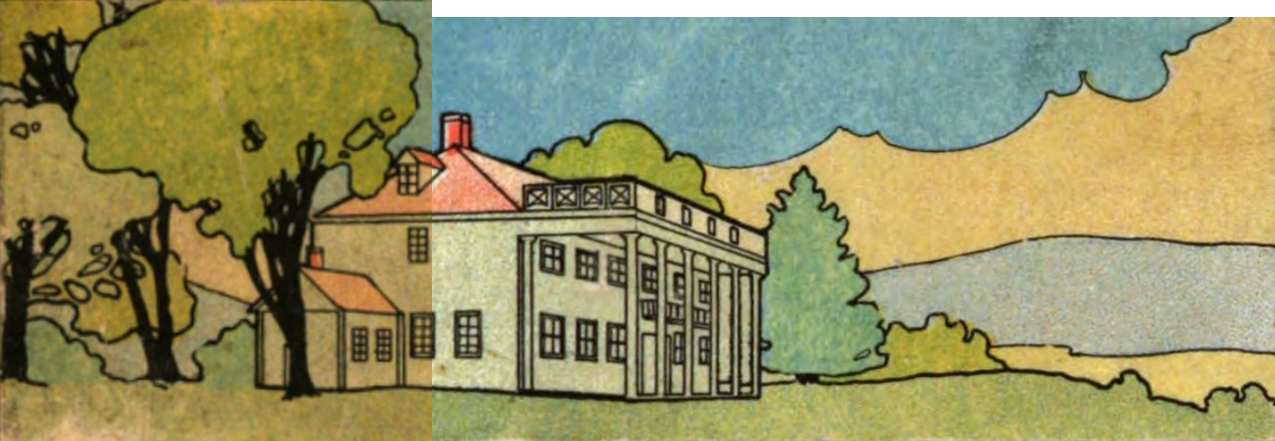
composite cover illustration (U Mich at left, Harvard at right, minus their respective shelfmark stickers)
There are a few “N” words here and there, and even more “negroes” playing their local-color-background parts in this white folks’ story. At least Blacks are not invisible in these pages. I could but won’t list all that fucked up evidence. The foreground story is well written about its principals, elegiac sometimes, pretty good on character. Reviews I have found, address its having been authored by two writers, some of them pausing to consider the effect this might have had on consistency of the characters. As someone who lately wonders whether any identity is but a mirage to begin with, that possible effect (of multiple and thus unreliable authorship) begins to seem a virtue.
Here are those reviews, some transcribed in part and even whole.
- review (by “J. S. D.”) in The Reader 2:2 (July 1903) : 211-212
via google books: linkexcerpt (paragraphs 3 and 4, of five total) —
Two important qualities distinguish “The Redfields Succession” : the originality and fitness of the descriptions and the swift interest of the conversations. There is perhaps a trifle too much “information” concerning horses and their keep, and too much veterinary sententiousness and unessential equine reminiscence; a thorough course in the fiction of these gentlemen is really all that is necessary to “go in” one’s self raising and racing successfully the very proudest stock in the country. But as a rule, the writers have exhibited art in both their enthusiasms and transitions, and have relied unfailingly on their own acute powers of observation.
The principle characters are not always perfectly clear of outline. Trueman Gault, for example, seems to waver and change at times almost to the point of forfeiting his personality; and St. Clair as well as Virginia in a minor degree, undergo “shifts” which damp familiarity and make us wary how to greet them. We then wonder just what relation this uncertainty of character development bears to the dual authorship. How can two men, no matter how much they may attempt to define a character, really see him in exactly the same light? But this shortcoming is not sufficiently vivid to rob the tale of its peculiar and decisive interest. - “A Story of the South,” a lengthy and positive review in The New York Times (July 11, 1903) : link (paywall)
- William Dean Howells, “Diversions of the Higher Journalist, A Grain of Wheat in the Heap of Chaff” in Harper’s Weekly (June 27, 1903) : 1093
google books : linkthis is not a review, but a (quite interesting) discussion of the place of the “old South” in the evolving American imaginary —
“You must feed your fancy somewhere, and you prefer to pasture it, just now, in the Southern swamps, sand hills, and pine barrens. You tried for a while to make an ideal of the humorous blackguard of the Western frontier, but he could not last; he had his little day, with his joke, his slang, and his gun, but he could not last. You are a lot of snobs, you poor, later Americans, and you must somehow have your superiors. You have tried finding them among your new rich, but the life of your millionaires forbids anything like romantic association. It is too obviously vulgar, too openly and hopelessly dull, for the vine of sentiment to cling to, or the flower of poetry to perfume. So you turn, not unnaturally, to the old South, and look for your superiors there: men all courage and love, women all tenderness and daring self-sacrifice. I don't blame you; I try to account for you, to define you.”
I break here, only so that the following passage stands out —
“You are sick and ashamed of your getting and having, and you yearn for social conditions in which these shall not be the highest things. But you are looking in the wrong place, when you look toward the past anywhere, and especially the the past of our South.”
(aside, thinking of how, in America’s failures, it (variously construed, and certainly favoring mainstream Euro/white folks) not only does it look to the past, but to futures and above all to the distances, where we can export democracy and hygiene etc etc via bombs and the Peace Corp and Fulbright scholarships and other forms of enlightened, selfless largesse.)
- The Literary News 24:6 (June 1903) : 183
via google books : link“The scenes of this story are laid chiefly in Virginia, and give an accurate and entertaining account of Virginia country life. The principle characters are a southern girl and an impecunious New Yorker, who is a fine fellow at bottom and descendant of an old Virginia family. There is an exciting contest over the will made by his uncle, who owned the handsome estate of Redfields, and there are many turns in the plot before the final denouement.”
- review (among “Books of the Week”) in Public Opinion (4 June 1903) : 730 : link (google books)
“Trueman Gault, a reporter on a New York paper, falls heir to a Virginia plantation by the death of his uncle, who left no will. His uncle’s intention to bequeath his estate to his widowed step-daughter is well known in the neighborhood, but not to the new heir, who later on finds an unsigned holograph will directing such a disposition of the property. How far is a man justified in profiting by the mistakes of others when he himself is without fault? That is the question that presents itself to the mind of the young gentleman, and he answers it in a manner worthy of a gentleman and a member of the F. F. V. [first families of Virginia]. Incidentally, the reader is introduced to some very attractive, highbred, hard-riding, sometimes harddrinking, and always debonnair descendants of the ante-bellum aristocracy of Virginia. There is not an unprincipled man or a homely girl in the book.”
- review in “Recent Fiction,” by William Morton Payne, in The Dial (August 1, 1903) : 67 : link (google books)
“Messrs. Boone and Brown, who collaborated in the writing of Eastover Court House, have again joined forces in the production of a Virginia novel. The Redfields Succession is the title of this book, which tells how an impecunious newspaper reporter comes unexpectedly into possession of a Virginian estate, enjoys it for awhile, learns that he has no moral right to it after all, sacrifices it by resorting to what verges upon a criminal device, and in the end is suitably rewarded for what he has done. The scene of the story is laid in Virginia, for the most part, and has a good deal to do with fox-hunting and other less strenuous social festivities. The book has no style worth speaking of, and its plot is of the most elementary sort, but it is the product of intimate first-hand observation, and has an easy-going quality that makes it pleasant reading.”
6 January 2025